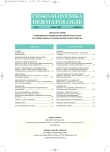-
Medical journals
- Career
Diffuse Reflectance Spectrophotometry I. Spectrophotometer and Its Engineering Solution
Authors: K. Soršáková-Trnovská 1; M. Keppert 2; V. Hegyi 1
Authors‘ workplace: Detská dermatovenerologická klinika LFUK a DFNsP v Bratislave prednosta kliniky doc. MUDr. T. Danilla, CSc. 1; Ústav merania SAV v Bratislave riaditeľ ústavu doc. ing. M. Tyšler, CSc. 2
Published in: Čes-slov Derm, 84, 2009, No. 2, p. 109-115
Category: New drugs, cosmetics, devices
Overview
Diffuse reflectance spectrophotometry (DRS) is a non-invasive method recently gaining ground. The rapid technical development and need for objectification of realized examination and preservation of skin surface integrity favours non-invasive methods in the diagnostic process. Diffuse reflectance spectrophotometry is based on the interaction of optic radiation with the skin. Spectrophotemeter registers and analyses the reflected (direct and diffuse) light from the particular skin structures. This report is focused on engineering solution of spectrophotometer, device used in spectrophotometry to measure light intensity in correlation with the wave-length. The available types and components of spectrophotometers were analysed. Our experimental spectrophotometer was developed with regard to construction’s simplicity and easy setup of its technical components. Special attention was paid to selection of light-source and customers’ software for data collection specially designated for this application. This method has a wide clinical use in dermatology especially in evaluation of erythematous skin diseases and pigmentation disorders.
Key words:
diffuse reflectance spectrophotometry – difraction grating – spectrophotometer
Sources
1. Andersen, P.H., Abrams, K., BJERRING, P. et al. A time correlation study of UVB induced erythema measured by reflectance spectroscopy and laser Doppler flowmetry. Photodermatol. Photoimmunol. Photomed, 1991, 8, p. 1-16.
2. ANDERSON, RR., PARISH, A.J. The optics of human skin. J. Investigative Dermatol, 77, 1981, p. 13-19.
3. ARAUJO, C. Filter Transmission setup. Catholic University of Vaparaiso, 2001,
http://www.ctio.noao.edu/instruments/filters/setup.html#top.
4. DEARDEN, S. Spectroscopy, astronomy and optics: Basement Spectroscopy: Spectrograph mountings: The Czerny-Turner mounting and variations. Forum for Amateur AstroSpectroscopy, 2004, http://www.astrosurf.com/dearden/ Web%20Pages/Basement%20Page/Mountings/Mountings%20Page%204.htm.
5. FIKRLE, T., CETKOVSKÁ, P., RESL, V. Měření přirozené pigmentace kúže metodou remitenční spektrofotometrie. Čes.-slov. Derm. 79, 2004, 3, p. 103-108.
6. HORIBA, J.Y. MikroHR, a compact versatile Czerny-Turner Spectrometer. Horiba Jobin Yvon, 2005, http://www. jobinyvon.com/usadivisions/mono/microhr.htm.
7. CHAMBERS, M.A., JAHANS, K., WHELAN, A. et al. Simple objective measurement of the cutaneous delayed-type hypersensitivity reaction to tuberculin using spectrophotometry. Skin Research and Technology, 8, 2002, p. 89-93.
8. CHINEA CORDO, M., SENDRA SENDRA, J. R., SILVA LÓPEZ, S. M. et al. Pigmented skin lesions studies by VIS – NIR reflectance sp ectroscopy in the Canary Islands: preliminary study. Proc. SPIE, 5141, 2003, p. 157-167.
9. KOLLIAS, N., BAQER, A. On the assessment of melanin in human skin in vivo. Photochem Photobiol, 43, 1986, p. 49-54.
10. KOLLIAS, N., BAQER, A. Spectroscopic characteristics of human melanin in vivo. J. Investigative Dermatol, 85, 1985, p. 38-42.
11. KOLLIAS, N., BAQER, A. Quantitative assessement of UV – induced pigmentation and erythema. Photodermatol. 5, 1988, p. 53-60
12. KOLLIAS, N., STAMATAS, G.N. Optical Non-invasive approaches to diagnosis of skin diseases. The Society for Investigative dermatology, 7, 2002, p. 64-75.
13. KOLLER, L. Analytická chémia: Prístrojové analytické metódy: Spektrálne metódy. Technická univerzita v Košiciach 2002, p. 57-102.
14. KRAEMER KLOECKNER, C., MENEGON BARATZ, D., CESTARI FERREIRA, T. Determination of the minimal phototoxic dose and colorimetry in psoralen plus ultraviolet a radiation therapy. Photodermatol Photoimmunol Photomed, 21, 2005, p. 242-248.
15. LIEBOLD, K., FAßLER, D., SCHMIDT, W.D. et al. In vivo spectroscopy in dermatology: methods and new fields of application. JEADV, 14, 2000, p. 1–4.
16. MOYAL, D., REFRÉGIER, J.L., CHARDON, A. In vivo measurement of the photostability of sunscreen products using diffuse reflectance spectroscopy. Photodermatol Photoimmunol Photomed, 18, 2002, p. 14-22.
17. REICHERTZ, J. Astronomie: Spectralanalyse. Das Redactionsburo fur Technik – Themen, 2005, http://REICHERTZ Das Redaktionsbüro für Technik-Themen.htm.
18. RESL, V., PRÚCHA, J., CETKOVSKÁ, P. et al. Objektivizace barvy kúže – chromametrie (kolorimetrie, chromatometrie) a remitenční spektrofotometrie – I. Čes.-slov. Derm, 76, 2001, 6, p. 318-321.
19. RESL, V., PRÚCHA, J., CETKOVSKÁ, P. et al. Objektivizace barvy kúže – chromametrie a remitenční spektrofotometrie – II. Čes.-slov. Derm, 77, 2002, 1, p. 35-44.
20. RESL V. Bioinženýrske metody v dermatovenerologii I. Přístrojové metody ke stanovení různych parametrú kůže. Čes.-slov. Derm. 77, 2002, 3, p. 133-138.
21. RESL, V. Bioinženýrske metody v dermatovenerologii II. Přístrojové vyšetřovací metody zobrazující kůži nebo její struktury. Čes.-slov. Derm, 77, 2002, 6, p. 264-272.
22. RESL, V., PRÚCHA, J., CETKOVSKÁ, P. et al. Kožní spektrofotometr s kontinuálním spektrem. Čes.-slov. Derm, 77, 2002, 3, p. 125-130.
23. RIORDAN, B., SPRIGLE S., LINDEN M. Testing the validity of erythema detection algorithms. Journal of Rehabilitation Research and Development, 38, 2001.
24. SENDERÁKOVÁ, D.: Fraunhoferova difrakcia svetla na mriežke, http://www.fmph.uniba.sk/~senderakova/ko/1uc/ fp3/Uloha-10.pdf, p.1-4.
25. STATAMAS, G. N., ZMUDZKA, B. Z, KOLLIAS, N. et al. Non-invasive measurement of skin pigmentation in situ. Pigment Cell Res, 17, 2004, p. 618-626.
26. TAKIWAKI, H., MIYAOKA, Y., KOHNO, H. et al. Graphic analysis of the relationship between skin colour change and variations in the amounts of melanin and haemoglobin. Skin Reasearch and Technology, 8, 2002, p. 78-83.
Labels
Dermatology & STDs Paediatric dermatology & STDs
Article was published inCzech-Slovak Dermatology

2009 Issue 2-
All articles in this issue
- Atopic Dermatitis in the Year 2009
- Preservatives Releasing Formaldehyde Causing Occupational Eczemas in Metal Cutters
- Oxidated Cellulose in the Therapy of Chronic Leg Ulcers – Results of Clinical Study
- Hypersensitivity to Nickel – Always Current Topic
- Diffuse Reflectance Spectrophotometry I. Spectrophotometer and Its Engineering Solution
- Czech-Slovak Dermatology
- Journal archive
- Current issue
- Online only
- About the journal
Most read in this issue- Diffuse Reflectance Spectrophotometry I. Spectrophotometer and Its Engineering Solution
- Atopic Dermatitis in the Year 2009
- Preservatives Releasing Formaldehyde Causing Occupational Eczemas in Metal Cutters
- Hypersensitivity to Nickel – Always Current Topic
Login#ADS_BOTTOM_SCRIPTS#Forgotten passwordEnter the email address that you registered with. We will send you instructions on how to set a new password.
- Career

